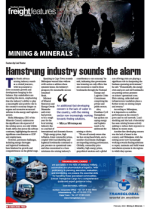The Democratic Republic of the Congo (DRC) remains steadfast in its commitment to expanding cobalt exports, despite a decline in prices throughout 2023.According to DRC prime minister Jean-Michel Sama Lukonde Kyenge, the country produced around 140 000 tonnes of cobalt last year. During the first half of the year, the DRC exported approximately 52 000 tonnes of cobalt in metal content, a year-on-year decrease of 22.74%.Despite the drop in cobalt prices witnessed in 2023, the DRC faced additional hurdles. High copper prices led to a surge in the country's copper exports, consuming a significant portion of its transportation capacity. This surge resulted in logistical challenges in moving cobalt, exacerbating ongoing issues with customs clearance and domestic turmoil. Moreover, concerns regarding child labour in the cobalt sector added further complexities to the situation, highlighting human rights concerns in the DRC's mineral industry.According to Kyenge, the country is committed to growing its cobalt exports, particularly in light of the growing demand for the commodity used extensively in new-age batteries. “It is an important commodity for our country but also for the world. Its extended use in lithium batteries, electric vehicles, smartphones and laptops means demand will continue for the foreseeable f uture.”This comes despite warnings that the oversupply and low prices of cobalt are expected to persist throughout 2024. Analysts maintain that demand is somewhat f lagging considering that some battery manufacturers are moving away from the metal, opting for cheaper alternatives instead. Much of this move has been attributed to ongoing human rights issues linked to cobalt mining in the DRC.Research firm S&P Global is predicting low market prices to continue for cobalt throughout 2024. Wood Mackenzie analysts agree, saying it will be a difficult year for the metal as cobalt is expected to remain in oversupply.In 2023 the country accounted for an estimated 76% of global cobalt production.Exporting more cobalt, however, will require some serious thought around improving its logistics and sharing transport resources with its booming copper trade. In January, the DRC announced it had signed an agreement with Chinese construction companies Sinohydro Corp and China Railway Group for a $7-billion infrastructure deal. The two companies had agreed with the previous DRC government to invest $3bn.

